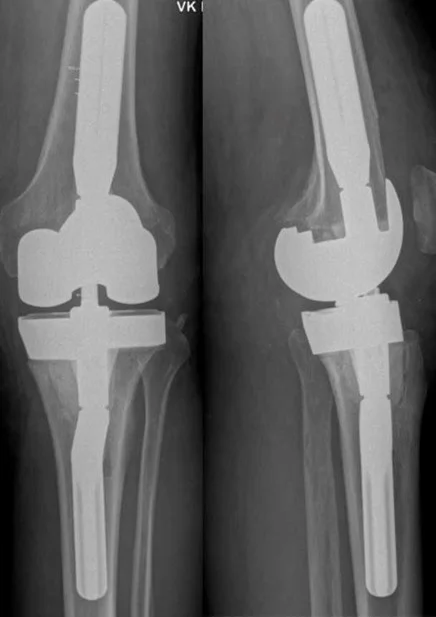This is how our application simplifies the booking and administration process. Interested >>
Revision knee replacement surgery
It can happen that a knee prosthesis does not function well, and the patient experiences health issues. In this case, medical specialists may recommend the replacement of the implant.
Replacement of a knee prosthesis may become necessary in the following cases:
- joint infection,
- mechanical loosening can be detected in one of the components,
- the prosthesis has become instable,
- the products of wear down induced an inflammatory reaction,
- the bone is split or fractured around the prosthesis,
- the prosthesis is worn down or broken.
Complaints and symptoms which precede knee prosthesis replacement
Knee prosthesis problems may be indicated by pain, which may increase on a greater load or when walking for a longer period of time, but it could decrease or cease at rest.
Chills, fever, swelling, and skin redness may develop if infection is present.
Frequent issues are decreasing walking ability and walking distance, limb shortening and limping, moreover, the inability to walk may develop in case of a fracture or dislocation.
How is a revision surgery performed if the prosthesis is infected?
In case of an infection, often the most adequate procedure is a two-step intervention which consists of the prosthesis replacement and a long-term antibiotic treatment. During the first surgery, the infected components of the prosthesis (covered by the so-called biofilm) and the surrounding devitalized (no longer vital) tissues are removed, then after thorough rinsing, a temporary cement spacer impregnated in antibiotics is inserted, if needed.
This spacer is usually left in its place for about two months during which the patient receives antibiotic treatment, and a laboratory test is also performed, if needed. Once the surgeon evaluated that the infection was successfully eliminated, the final revision prosthesis will be implanted during a second surgery.
How is a revision knee prosthesis replacement surgery performed?
The knee prosthesis replacement is performed in spinal or general anesthesia.
The knee joint is explored through the incision made above the kneecap. The revision surgery usually requires a greater incision and may be accompanied by greater blood loss than the original knee replacement surgery. (The incision is always made in a way, so that the surgeon can have the best access to the knee joint.)
Afterwards, the damaged joint surfaces are removed, and the place of the prosthesis is created on the lower leg bone and the thigh bone in a way that the prosthesis made of tissue-friendly plastic and metal can be secured well with bone cement.
If only one side of the knee joint is affected, then a so-called unilateral knee prosthesis will be implanted, if both sides are involved, then total knee prosthesis replacement surgery is done. It may also occur that the surface of the kneecap needs to be replaced too.
The axis of the knee joint and the adequate elasticity of the ligaments can be restored by selecting the degree of bone removal and the size of the prosthetic components.
One or two drains are placed into the surgical site due to the bleeding that accompanies the intervention. The wound is closed after thorough bleeding reduction. A cover bandage and an elastic bandage are applied.

It is extremely important to select the time of the surgery, and to thoroughly plan and prepare the intervention. Despite the highest level of professional care, rarely it may occur that a new prosthesis cannot be implanted. In a case like this, surgical fixation may be performed.
What happens if the knee prosthesis is not replaced?
Complications may develop if the intervention is delayed. It can be expected that the pain will increase, the disability may aggravate further, and the quality of life may significantly deteriorate. Additionally, the efficiency of a surgery which is performed later may decrease.
If you have any questions, please send a letter to magankorhaz@bhc.hu!


